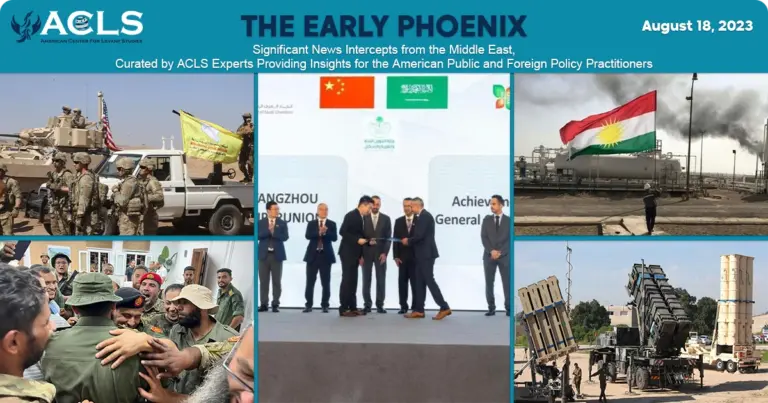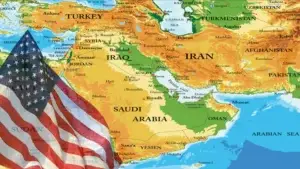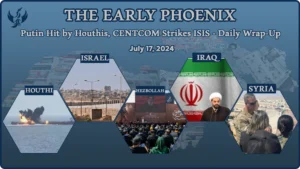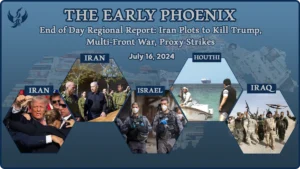Listen to this article
TOP HEADLINES:
- Saudi Arabia and China Ink Investment Deals Exceeding $1.3 Billion
- Norwegian Oil Company Partially Restarts Oil Production in Iraqi Kurdistan
- Coalition and SDF Joint Operation Eliminate High-Ranking ISIS Leader in Raqqa
- US Approves Historic $3.5 Billion Israeli-German Deal for Arrow 3 Air-Defense System
- Tensions Ease as Libyan Capital Witnesses Commander’s Release Amid Ceasefire
TURKIYE
- The US Imposes Sanctions on Turkiye-Backed Syrian Militias for Rights Abuses (Al Monitor). The US Treasury has sanctioned two Turkey-backed Syrian militias, Suleiman Shah Brigade and Hamza Division, accused of displacing and oppressing the Kurdish population in Syria’s Afrin. Allegations include human rights abuses and forced displacement. These groups, part of the Syrian National Army, stand accused of rights violations against Kurds, Yazidis, and others. Treasury revealed leader Abu Amsha’s orchestrated abductions and property seizures, with his car dealership as a financial conduit. Hamza Division faces similar accusations. The Biden administration has shown a commitment to accountability for rights violations.
- Turkiye Bolsters Border Security with Advanced Technology Amid Irregular Migration Challenges (Daily Sabah). Turkiye, a primary route for irregular migrants heading to Europe, employs cutting-edge technology to fortify its border security against illegal crossings from Iran. Electro-optic towers, thermal cameras, and ground surveillance radar monitor a concrete wall spanning the Ağrı province’s 83.6-kilometer border section. The border fortification, including 71 of 103 towers, is reinforced by thermal cameras capable of detecting movement up to 10 kilometers away. While experts await a comprehensive assessment, the wall and increased patrols have already curbed irregular migration, a significant concern for Turkey, which strives to address the issue through international cooperation.
- Monetary Tightening Cycle Likely to End, Positive for Global Economy: Turkish Treasury Minister (Yeni Safak). Mehmet Simsek, Turkiye’s Treasury, and Finance Minister, expressed optimism on Thursday, suggesting that the global economy is poised to exit the monetary tightening phase. Speaking at the general assembly of the Banks Association of Turkey, Simsek noted that the possibility of monetary easing by the latter half of 2024 has increased.
ISRAEL AND PALESTINIAN TERRITORIES
- IDF Officers Brief Knesset Subcommittees on Readiness Amid Reservist Protests (Jerusalem Post). Top Israel Defense Forces (IDF) officers updated Knesset Foreign Affairs and Defense Committee (FADC) subcommittees regarding the military’s state of readiness due to reservists resigning in response to the government’s judicial reform measures. The officers highlighted key concerns and emphasized that the Israeli Air Force (IAF) and Intelligence Corps are the most affected units, directly impacting national security.
- Historic $3.5 Billion Israeli-German Military Deal for Arrow 3 Air-Defense System Gets US Approval (Al Monitor). The largest military export deal in Israel’s history is set to proceed following the United States endorsement of Germany’s $3.5 billion acquisition of the advanced Arrow 3 air-defense system. Developed through a collaboration between the Israel Missile Defense Organization and the United States Missile Defense Agency and manufactured by Israel Aerospace Industries, the Arrow 3 system is poised for formal commitment with a letter signed by senior officials from both countries. The entire contract will be finalized by the year’s end, subject to approval from the German and Israeli parliaments.
- 80% of New Israeli Startups Opt for Incorporation in the US Amid Economic Advantages and Judicial Overhaul Uncertainty (Times of Israel). According to reports by Reuters, a substantial 80% of emerging Israeli startups are choosing to incorporate in the United States, predominantly within Delaware. The trend is attributed to the combination of economic benefits in the US and mounting uncertainty surrounding Israel’s ongoing judicial reform. This shift is evident in the Israel Innovation Authority (IIA) survey. It indicates that as many as 80% of new Israeli tech startups in 2023 selected Delaware as their incorporation destination, a significant increase from the 20% recorded in 2022.
Egypt & North Africa
- Tensions Subside as Libyan Capital Witnesses Release of Commander Amidst Ceasefire (Al Sharq Al Awsat). Following intense clashes in Libya’s capital, Tripoli, a sense of relief and festivity has replaced the atmosphere of bloody conflict. Celebrations and fireworks filled the skies of Tripoli to mark the release of Mahmoud Hamza, the leader of the “444 Combat” brigade, temporarily closing a chapter of recurrent battles between armed factions. The clashes led to 50 casualties and over 160 injuries, prompting local, regional, and international condemnation.
- Sudan’s Dire Situation Deepens After Months of War; International Relief Agencies Raise Alarm (Sudan Akhbar). Sudan’s situation has deteriorated significantly after four months of ongoing conflict, with battles spiraling out of control, as expressed by international relief agencies. The war’s devastating impact has led to widespread displacement and a looming threat of famine for millions of people. In a joint statement, leaders of twenty international organizations have emphasized the urgent need for humanitarian assistance in Sudan. They’ve highlighted that a staggering 14 million children need aid, with over four million displaced.
- New Gas Pipeline to Link Israel and Egypt for Enhanced European Gas Exports (CNN Arabic). Israeli and Egyptian companies engaged in the gas export sector have concluded technical studies for constructing a new gas pipeline connecting the two nations. This pipeline aims to transport increased gas quantities to Egyptian liquefaction facilities, paving the way for its re-exportation to Europe. According to an informed source, gas production companies in Israel will bear the pipeline’s construction costs, projected to take two years to complete.
The GULF REGION & YEMEN
- Omani Delegation Arrives in Yemen’s Sanaa to Urge Houthi Acceptance of UN Truce Proposal (Xinhua). An Omani delegation has arrived in Sanaa, the capital of Yemen, under Houthi control, intending to persuade the Houthi group to agree to a UN proposal for restarting a ceasefire with the Yemeni government. The visit comes as the Iranian foreign minister is visiting Riyadh to promote the peace process in Yemen.
- Saudi Delegation Attends Moscow Conference on International Security to Discuss Defense Cooperation (Al Sharq Al Awsat). A Saudi delegation led by Engineer Talal Al-Otaibi, Assistant Minister of Defense, participated in the Eleventh Moscow Conference on International Security 2023 alongside defense and foreign ministers, military leaders, and policymakers worldwide. The conference aims to address contemporary military challenges and threats while fostering discussions among decision-makers and experts in politics, defense, and security. During the meeting, Saudi Assistant Defense Minister Al-Otaibi engaged in conversations with several counterparts, including Russian Deputy Defense Minister Alexander Fomin, Chinese Minister of Defense Li Shangfu, Pakistani Secretary-General and Deputy Minister of Defense Hammoud Zaman Khan, and Iranian Deputy Chief of the General Staff Brigadier General Aziz Naseerzadeh.
- Saudi Arabia and China Sign Investment Agreements Worth Over $1.3 Billion (Lusai News). Saudi Arabia and China have inked investment agreements exceeding 5 billion Saudi riyals (approximately 1.3 billion US dollars) on the sidelines of the Saudi-Chinese Forum held in Beijing. The forum emphasized collaboration and explored investment prospects between the two nations, particularly in infrastructure, housing, real estate development, and financing. A total of 12 agreements and memorandums of understanding were signed, strengthening their partnership in areas including housing and infrastructure. The value of trade between China and Arab countries, which surged 30% to $421 billion in the past year, had Saudi Arabia accounting for around 25% of the total at $106 billion in 2022.
- Iran Engages in Investment Talks with Qatar and UAE for Free Zones Expansion (BNReport). Iran has initiated discussions with Qatar and the United Arab Emirates (UAE) regarding investment opportunities in Iranian-free zones. Hojjatullah Abdul-Malik, Adviser to the Iranian President and Secretary of the Supreme Council for Free and Private Commercial, Industrial, and Economic Zones, highlighted that his country is engaged in ongoing talks with Qatar and the UAE to expand collaboration. He emphasized the significance of cooperation with these nations, adding that Iran is also negotiating with other Arab and Islamic countries to establish joint free economic zones, similar to its arrangement with Oman. The World Bank’s latest report projects Iran’s economy to grow by 2.2% in 2023, outpacing global growth rates, despite ongoing sanctions and the deflationary monetary policies of central banks worldwide.
- Iran’s Foreign Minister Visits Riyadh for Talks on Bilateral Relations (Al Sharq Al Awsat). Iran’s Foreign Minister, Hossein Amir Abdollahian, has visited Riyadh for one day. He is expected to hold discussions with his Saudi counterpart, Prince Faisal bin Farhan. The talks will focus on bilateral relations and their development, particularly following the restoration of diplomatic ties between the two countries in March, facilitated by China. The visit coincides with the official assumption of duties by the newly appointed Iranian ambassador to Riyadh, Ali Enayati. Enayati expressed confidence in deepening cooperation and emphasized the importance of dialogue as the foundation for Gulf region discourse. Saudi Arabia and Iran had signed an agreement to resume diplomatic relations after a nearly 7-year break, and they pledged to respect sovereignty and avoid interference in internal affairs in their joint statement.
IRAN
- Iranian Regime’s Science Network Targets UK Academics for Dual-Use Technologies (Jewish Chronicles). An Iranian scientific network led by an individual with links to Iran’s Islamic Revolutionary Guards Corps (IRGC) is reportedly attempting to engage UK-based academics specializing in dual-use technologies. The network director, Mohammad Hussain Ataee Dolat Abadi, has reportedly persuaded experts from universities, including Cambridge, Birmingham, Glasgow Caledonian, and University College London, to participate in conferences and share their expertise in Tehran.
- Iran Faces Worsening Water Crisis as Hundreds of Cities Experience Water Stress (Iran Focus). Iran is grappling with a severe water crisis as approximately 269 cities face water stress, according to Iran’s water industry spokesperson. Water supply sources in various regions, including dams and groundwater reservoirs, are threatened due to drought and mismanagement. The situation is particularly dire in cities such as Mashhad, Tabriz, Zanjan, and Tabas, with water sources like the Chahnimeh wells in Sistan and Baluchestan province at risk of depletion. Despite acknowledging the crisis, the spokesperson emphasized launching new water supply projects and denied a severe water shortage.
- Iran’s Support for Palestinian Terror Groups Raises Concerns in the Region (JNS). The recent decision by the U.S. administration to provide Iran with access to funds, including billions of dollars held in South Korea, as part of a prisoner exchange deal has raised concerns about the potential impact on Iran’s support for Palestinian terrorist organizations, particularly Hamas and Palestinian Islamic Jihad. These groups, designated as terrorist organizations by multiple countries, have historically received financial and military assistance from Iran.
- Iran’s Supreme Leader Praises Revolutionary Guard Amidst Growing Concerns of Protests (Iran International). Iran’s Supreme Leader, Ali Khamenei, has praised the Islamic Revolutionary Guard Corps (IRGC) as “the largest counter-terrorist organization in the world” during a meeting with senior IRGC officers and Basij paramilitary leaders. This statement comes amidst international calls to designate the IRGC as a terrorist organization. This move was implemented by the United States in 2019 but has not been uniformly adopted by other countries…Despite international concerns and domestic challenges, Khamenei continues to view the IRGC as a powerful and capable organization that serves his interests. The IRGC’s activities, both within Iran and across the region, have generated controversy and have raised concerns about regional stability, terrorism, and human rights violations. Designating the IRGC as a terrorist organization remains a contentious issue in international politics, balancing concerns over security with diplomatic considerations.
SYRIA
- Dutch Foreign Ministry Report Highlights Dire Situation in Syria (Syria TV). The report underscores the dire situation in Syria, where economic hardships, human rights abuses, and criminal activities have become pervasive. The regime’s grip on power, its network of loyalists, and its control over the economy have led to a cycle of corruption and repression that continues to affect the lives of millions of Syrians. The report also highlights the challenges refugees face attempting to return to Syria, as the risks of persecution and abuse remain high.
- International Coalition and SDF Joint Operation Targets ISIS Leader in Raqqa (Al Sharq Al Awsat). The operation targeted Ibrahim Al-Ali, also known as Abu Mujahid, a high-ranking official within ISIS. SDF’s counter-terrorism units operated with coordination and air support from the coalition forces. The process comes from ongoing efforts to combat ISIS and disrupt its regional activities. The SDF has closely coordinated with the coalition forces to track, apprehend, or eliminate key ISIS operatives. The SDF has also been engaged in multiple security operations to dismantle active and sleeper cells affiliated with ISIS.
IRAQ
- Norwegian Oil Company DNO Resumes Partial Oil Production in Kurdistan (Al Naharar). The Norwegian oil company “DNO” announced today, Thursday, that it had partially resumed last month’s oil production from the Tawki field in the Kurdistan region of Iraq and produced oil for the local market at a reduced price, with the continued closure of a significant export pipeline. And the Norwegian company turned to record operating losses amounting to $ 15 million in the second quarter of the year, compared to record profits of $ 81 million a year ago, with its total net production declining to the lowest level in 13 years.
LEBANON
- Lebanese Central Bank Reveals $8.5 in External Liquidity (24). This disclosure is a departure from the practices during Riad Salameh’s tenure when the central bank kept details of its assets and liabilities private from its regular reports. Salameh had been in the position since 1993 and stepped down on July 31, 2023. During his tenure, Riad Salameh mentioned in June 2022 that the central bank possessed over $11 billion in “usable reserves.” The recent announcement by the Banque du Liban marks a step towards greater transparency as Lebanon seeks to address its economic challenges and manage its financial resources more effectively. The disclosure includes information about Arab deposits worth $106 million and loans to Arab entities amounting to $660 million.
- Israeli and Lebanese Officials Hold Talks at UN Position on Border (i24). Israeli and Lebanese army officials met at a UN position on the border between the two countries under the auspices of the United Nations Interim Force in Lebanon (UNIFIL). Meetings between representatives from the Israeli Defense Forces (IDF) and the Lebanese Army are regularly held with the facilitation of UNIFIL since the end of the 2006 war. This meeting marked the 162nd such discussion between the parties.




